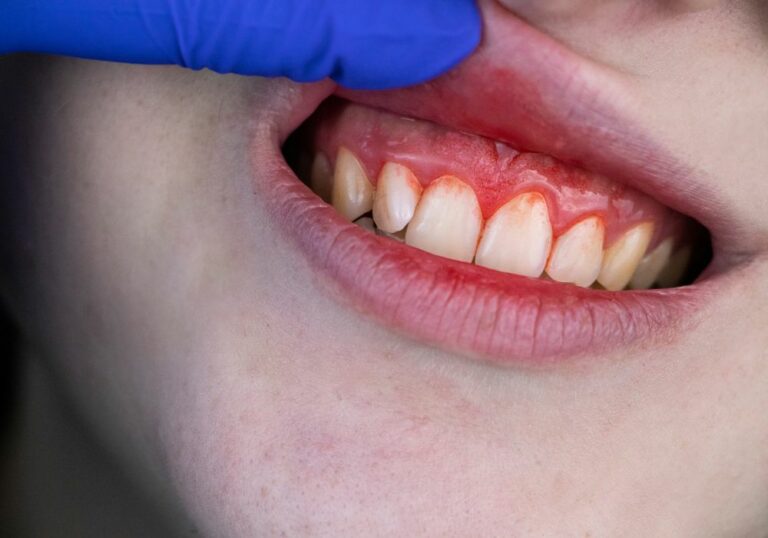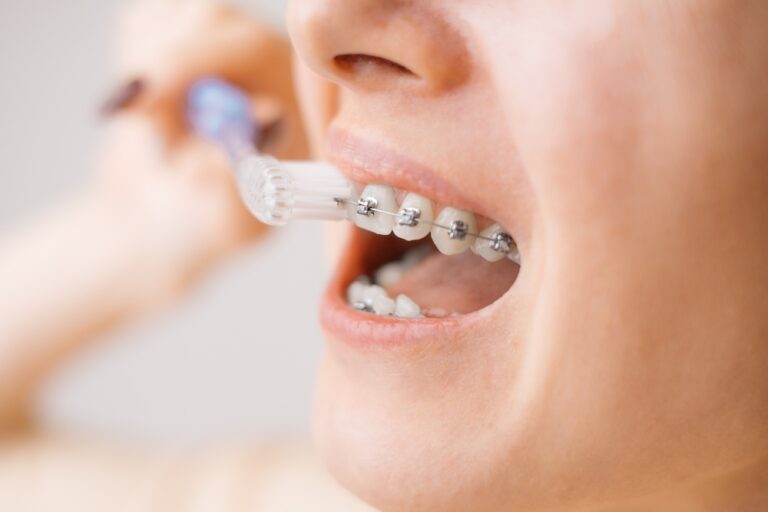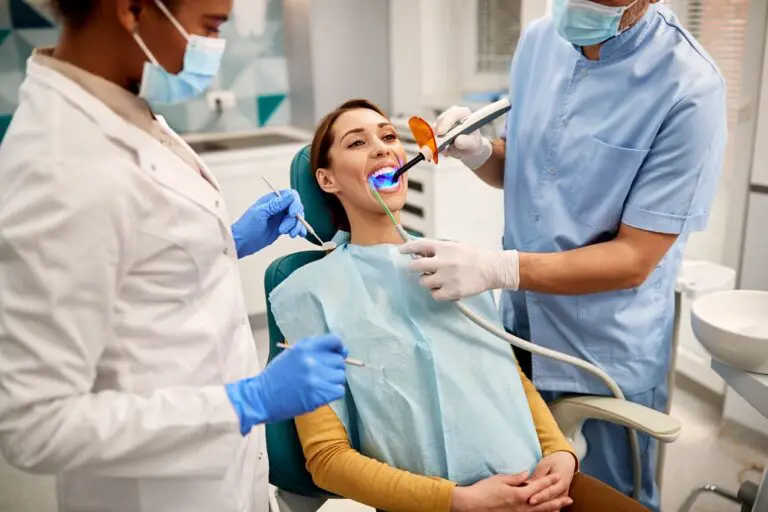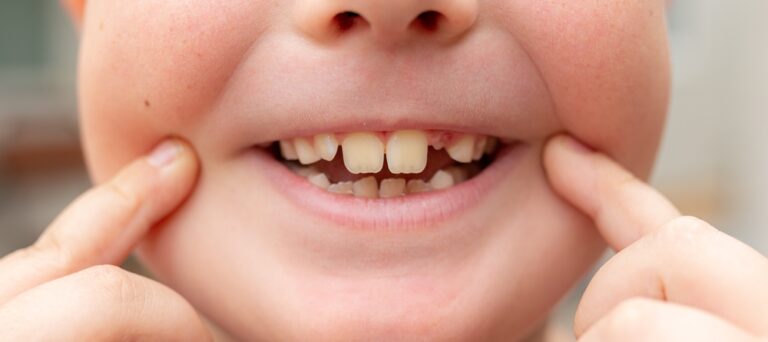What are Fake Teeth?
Before discussing whether super glue is appropriate for use on fake teeth, it’s helpful to understand what types of dental appliances fall under the category of “fake teeth”. These include:
Dentures
Dentures are removable appliances that replace some or all teeth in the mouth. They consist of a plastic base holding artificial teeth, and use clasps or attachments to secure them into place. Partial dentures fill gaps from missing teeth while complete dentures replace all teeth in an arch.
Dental Implants
Dental implants are artificial tooth roots surgically placed into the jawbone. Implants anchor crowns, bridges, or dentures in the mouth by providing sturdy, permanent attachments for prosthetic teeth. They are made from biocompatible metals like titanium.
Crowns
Also known as caps, crowns are restorations that cover damaged or decayed natural teeth to improve their shape and function. They are shaped and colored to look like real teeth. Crowns are commonly made from porcelain fused to metal, ceramic, or resin materials.
Veneers
Veneers are thin shells bonded directly to the front surface of teeth. Usually made of porcelain, they improve the color, shape, and position of front teeth that may be misaligned, chipped, cracked, or stained.
Composites
Tooth-colored composite resins are used to fill cavities, repair fractured teeth, or change the shape and shade of discolored teeth. Dentists sculpt these plastic resin materials directly onto the tooth’s surface where they are bonded and hardened using a curing light.
Temporary Appliances
Provisional or temporary dental appliances serve as substitutes while a permanent restoration is being made. These include flippers, partials, provisional bridges, and temporary crowns made from inexpensive acrylics or plastics.
Is Super Glue Safe for Use in the Mouth?
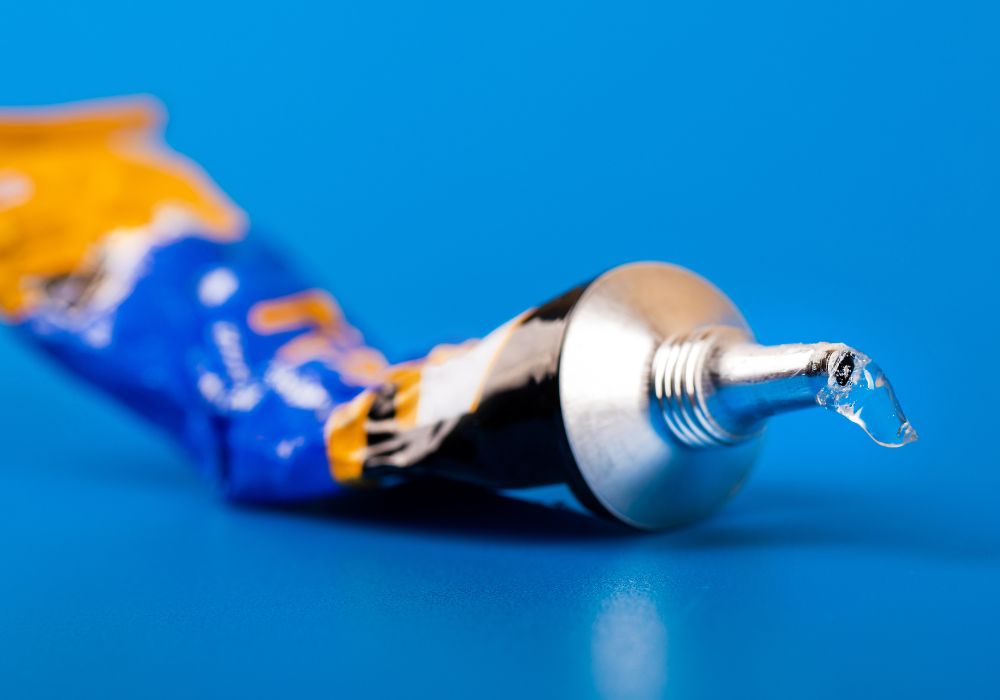
The oral cavity presents a unique environment that most household adhesives are not formulated for. The warm, moist conditions, exposure to saliva, chewing forces, and intake of food and liquids can all weaken or deteriorate bonds over time. Cyanoacrylate adhesives like super glue also give off heat as they cure, potentially irritating sensitive oral tissues.
For these reasons, super glue is generally not recommended for adhering anything permanently inside the mouth. The FDA considers super glue and other cyanoacrylate-based adhesives as “tissue adhesives” but has not approved them for use in dentistry. Only dental-grade cements, bonding agents, acrylics, and resins designed for intraoral use should be used long-term inside the mouth.
However, for temporary emergency repairs, a small amount of super glue can buy some time until dental repairs are possible. But extreme care must be taken to avoid complications like irritation, inflammation, accidental bonding of mouth tissues, fouling of denture clasps, and aspiration of loose pieces. The glue’s bonds will also deteriorally quickly with oral exposure.
Risks of Using Super Glue on Dental Appliances
While the rapid bonding of super glue seems ideal for quick fixes of dental hardware, it carries the following risks and downsides when used inside the mouth:
Cytotoxicity
As cyanoacrylate glues cure they release formaldehyde, a known irritant and potential carcinogen with extended exposures. The hot, stinging sensation caused by super glue is caused by an allergic-like reaction and inflammation. This can damage oral tissues like the tongue, gums, and cheeks.
Aspiration and Airway Obstruction
If tiny pieces of fractured teeth or hardware become dislodged in the mouth, they could potentially be inhaled or swallowed accidentally. Super glue greatly increases this risk if bonding fails.
Permanent Retention
Excess glue can flow onto and bond oral tissues like lips, gums, or cheeks causing pain and damage when separating bonded skin. It can also adhere strongly to denture clasps or dental work surfaces, making appliances difficult to remove without damage.
Cracking and Crazing
The forces of expanding and contracting super glue inside the mouth can distort and fracture acrylics and composites. It can also stain polished surfaces like porcelain. This can permanently damage dental work.
Bad Taste
The taste of super glue is quite unpleasant. Traces left in the mouth create discomfort and interfere with flavor perception. This effect is difficult to rinse away after gluing.
Poor Long-Term Stability
Super glue bonds rapidly but also deteriorates quickly with oral exposure to saliva, chewing forces, and temperature changes. Repairs may only last hours or days before failing again. The oral environment will break the strained bonds over time.
Plaque Retention
Excess glue left between teeth or dental work provides surfaces for oral bacteria to adhere to. This can lead to plaque buildup, tartar, and caries around margins if not cleaned away thoroughly.
Gastrointestinal Complications
Accidentally swallowing pieces of fractured dental materials glued together risks intestinal obstruction, irritation, or perforation. Toxic effects are also possible if ingested.
Benefits of Using Super Glue for Dental Repairs
Despite the risks, there are some potential benefits to using super glue for emergency dental repairs:
Fast Bonding
The rapid set time offers immediate repairs when a dental office is closed or an appointment is days away. This can temporarily stabilize damaged appliances or fractured teeth when time is critical.
Easy, Inexpensive, and Accessible
Super glue provides a cheap, easy-to-use option available in any home or convenience store. For those without dental benefits or unable to afford copays, it offers a DIY solution when finances are limited.
Moderately Strong Bond
The initial bond strength of cyanoacrylate adhesives is enough to withstand some limited chewing force. With care, super glue can hold strong enough to allow carefully eating soft foods for a short period.
Prevents Further Damage
Stabilizing cracked or chipped dental materials with super glue can prevent additional loss of tooth structure. This protects teeth from further damage while awaiting dental treatment.
Minimal Hardware Needed
A small dab of super glue is all that’s needed for spot repairs. No need for involved hardware like wires, clasps, or clips to stabilize dental appliances. Just dab, set, and stabilize.
Dental Applications Where Super Glue May Be Useful
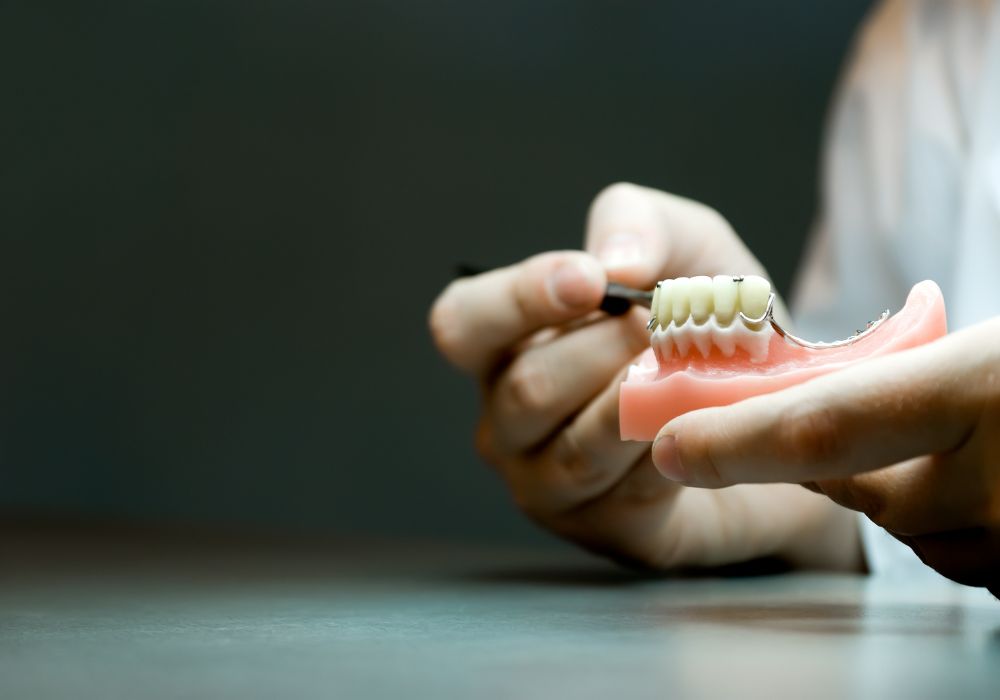
There are a few situations where utilizing super glue on a temporary basis could be beneficial until professional repairs are possible:
Stabilizing Cracked or Broken Dentures
Gluing fractured areas of plastic dentures may help hold them together enough for short-term use until a prosthodontist can properly repair and reline them. This prevents further damage.
Securing Loose Implant Parts
Super glue can temporarily hold loose implant crowns, abutments, or retaining screws in place if they detach. This protects fragile implant fixtures until replacements can be properly cemented.
Bracing Broken Orthodontic Wires or Brackets
Gluing detached or fractured wires and brackets may stabilize braces enough to prevent further detachment or swallowing of pieces while awaiting an orthodontist appointment.
Anchoring Loose Teeth
Gluing a wiggly natural tooth in place briefly can prevent air or saliva from passing through the gap, providing some pain relief and stabilization until dental extraction or root canal is arranged.
Tissue Irritation Protection
A small layer of super glue can temporarily coat sharp or rough edges on dental appliances that are irritating the tongue or cheeks while a dental adjustment visit is scheduled.
Guidelines for Safe Super Glue Use on Teeth
To maximize the benefits of super glue dental repairs while minimizing complications, these safety guidelines are recommended:
- Test super glue on skin first to evaluate for possible allergic reaction before intraoral use.
- Place absorbent pads or tissue around the repair site to prevent overflow onto other oral tissues.
- Opt for a gel-based super glue which will not run as easily as liquid versions.
- Limit application to the smallest amount needed for stabilization. Just 1-2 drops maximum typically.
- Allow adequate curing time before closing teeth together. Avoid premature biting pressure.
- Keep repaired areas isolated from other surfaces while glue sets for easiest removal later.
- Avoid spreading glue near denture clasps, wires, or movable parts to keep appliances functional.
- Smooth and remove any sharp excess glue edges that could break free or irritate tissues.
- Rinse mouth thoroughly with warm water after gluing to remove adhesive residue and odor.
- Eat a soft diet without chewing directly on the repaired area to prevent bond failure.
- Schedule a dental repair appointment as soon as possible for a permanent, professional fix.
Exercising great care and applying only tiny amounts of glue is crucial for avoiding complications. Super glue should never be used regularly or long-term inside the mouth.
Safer Dental Adhesive Alternatives to Super Glue
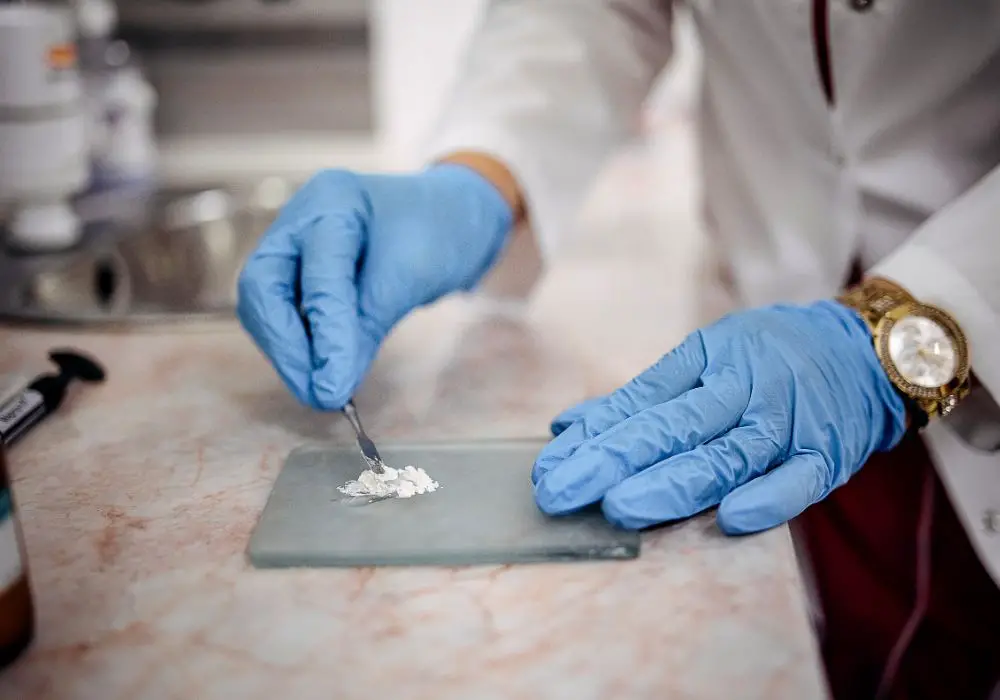
For less risky, dental-grade repairs at home, some adhesive alternatives to consider include:
Dental Cement
[Table comparing different types of dental cements]
| Type | Uses | Duration | Brand Names |
|---|---|---|---|
| Zinc oxide eugenol cement | Temporary crowns, inlays, bridges. Relining dentures. | 2-6 months | IRM®, SuperEBA® |
| Glass ionomer cement | Bonding crowns, bridges, veneers, fillings. | 2-5 years | KetacTM, Fuji IITM |
| Resin-modified glass ionomer | Restorations in non-stress areas. Bonding orthodontics. | 2-5 years | VitrebondTM, Fuji PlusTM |
| Compomer | Filling small cavities, cementing metal posts | 4-8 years | Dyract®, Compoglass® |
These adhesives all offer stronger, less toxic bonds than household super glue with varying working times. They are applied wet and set chemically. Most are available online or in dental supply stores for at-home use in emergencies until dental repairs can be made.
Dental Repair Kits
Several companies market dental repair kits for temporary, at-home fixes of dentures, partials, and crowns. They contain dental-grade adhesives, hard reline materials, or resin for bonding fractures and cracks. Popular options include:
- Super Poligrip Repair Adhesive – non-toxic denture fix that bonds stronger than super glue.
- Renew Dental Repair Kit – MMA material for plastic denture and acrylic repair.
- Tokuyama Rebase Fast – self-curing resin to rebond loose fitting dentures.
- Perma Repair System – light cured composite and bonding agent for fractured crowns or veneers.
These repair materials offer adhesives formulated for oral use that are less likely to damage appliances or irritate tissues than household super glue. They provide stronger repairs holding for weeks or months.
Soft Denture Relines
Applying a soft reline material to loose fitting dentures cushions them and can create a strong temporary seal holding for a few months. These often come as paste or strips applied directly to the denture surface. Popular options include:
- Coe Soft – thermoplastic polymer material applied with heat gun. Bonds firmly to acrylic.
- Lynal Soft Reline Material – self-curing, resilient reline material. Lab processed or placed directly.
- Fitty Dent – molded adhesive strips relined and contoured chairside.
Soft reline materials grip tissues better than rigid acrylics for secure, cushioned bonding. They offer a safe, adhesive alternative to super glue for refitting loose dentures at home.
Professional Dental Repair Options
For damaged dental appliances, seeing a dentist promptly remains the best solution. Professional repairs with dental materials far outweigh the benefits and duration of any DIY super glue fix. Some common dental options include:
Denture Repairs
- Cast metal framework repairs for fractured partial denture bases
- Using acrylic resin to rebuild cracks, gaps, or broken teeth in bases
- Replacing or adding new denture teeth to enhance fit and aesthetics
- Providing hard reline or rebasing materials for loose, poor-fitting dentures
- Securing broken or detached denture clasps
Crown and Bridge Repairs
- Recementing loose, separated crowns or bridges with dental cement
- Replacing cracked, fractured, or degraded porcelain facings or pontics
- Using bonding agents to re-adhere detached veneers or inlays
- Repairing chips or gaps in crowns with composite resin fillings
- Refabricating failing bridges or single crowns with poor prognosis
Implant Prosthetic Repairs
- Reattaching or replacing broken implant abutments
- Recementing loose implant crowns with temporary, then permanent cement
- Replacing broken or failed retention screws and o-rings
- Refabricating ill-fitting implant-supported dentures
- Soldering broken bars or attachments on implant overdentures
Visiting a dentist to utilize durable, high-bonding dental materials can resolve appliance damage and looseness long-term. However costly, professional repairs prevent ongoing damage and avoid complications from repeated super glue use. But in a pinch, super glue can offer a minimally-invasive temporary solution.
Conclusion
Overall, super glue is not recommended for adhering anything permanently inside the mouth due to risks of tissue irritation, fractured dental work, and deterioration in the oral environment. However, when used carefully in small amounts for temporary emergency repairs, cyanoacrylate glue can provide some benefits until professional dental treatment is available. With appropriate care and application, super glue can temporarily stabilize damaged or loose teeth just long enough to restore function. But dental-specific adhesives and professional repairs should always be pursued as quickly as possible for fixing damaged dental work. Used properly, super glue can serve as a helpful interim solution when finances or circumstances limit access to urgent dental care.
Frequently Asked Questions
Q: How long does super glue last on dentures or teeth?
A: In the moist, acidic environment of the mouth with chewing forces, super glue may only provide effective bonding from 12-48 hours on average before needing to be reapplied. Proper dental materials can last months or years.
Q: Is super glue strong enough to let me eat with repaired dentures?
A: Very minimally. The bonding strength of super glue is just enough to permit consuming only the softest foods temporarily if applied sparingly. But excessive chewing should still be avoided to prevent bond failure.
Q: Can super glue damage my dentures, crowns, or veneers?
A: Yes, super glue bonds aggressively and may distort, fracture, or stain acrylics, composites, and porcelain surfaces when curing or if penetration into cracks occurs. It can also permanently adhere to polished surfaces.
Q: Is it OK to use super glue long term on dental implants?
A: No, the oral environment will weaken super glue bonds over extended exposure. Only dental-grade cements and bonding agents should be used long-term to adhere crowns or dentures to implants for optimal stability and biocompatibility.
Q: Does super glue work on dental bonding material for braces?
A: Minimal amounts may temporarily stabilize cracked or detached orthodontic brackets just long enough to see an orthodontist promptly. But super glue should never remain on teeth undergoing active realignment.

